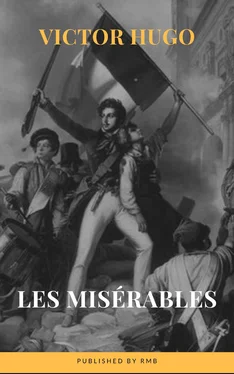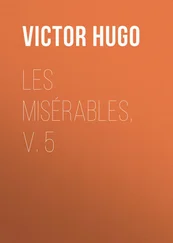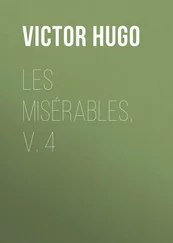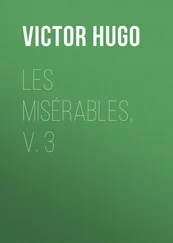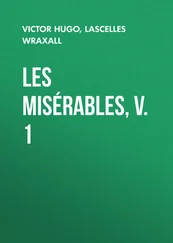Array RMB - Les Misérables
Здесь есть возможность читать онлайн «Array RMB - Les Misérables» — ознакомительный отрывок электронной книги совершенно бесплатно, а после прочтения отрывка купить полную версию. В некоторых случаях можно слушать аудио, скачать через торрент в формате fb2 и присутствует краткое содержание. Жанр: unrecognised, на английском языке. Описание произведения, (предисловие) а так же отзывы посетителей доступны на портале библиотеки ЛибКат.
- Название:Les Misérables
- Автор:
- Жанр:
- Год:неизвестен
- ISBN:нет данных
- Рейтинг книги:3 / 5. Голосов: 1
-
Избранное:Добавить в избранное
- Отзывы:
-
Ваша оценка:
- 60
- 1
- 2
- 3
- 4
- 5
Les Misérables: краткое содержание, описание и аннотация
Предлагаем к чтению аннотацию, описание, краткое содержание или предисловие (зависит от того, что написал сам автор книги «Les Misérables»). Если вы не нашли необходимую информацию о книге — напишите в комментариях, мы постараемся отыскать её.
Contains Active Table of Contents (HTML) and in the end of book include a bonus link to the free audiobook.
Sensational, dramatic, packed with rich excitement and filled with the sweep and violence of human passions, LES MISERABLES is not only superb adventure but a powerful social document. The story of how the convict Jean-Valjean struggled to escape his past and reaffirm his humanity, in a world brutalized by poverty and ignorance, became the gospel of the poor and the oppressed.
Les Misérables — читать онлайн ознакомительный отрывок
Ниже представлен текст книги, разбитый по страницам. Система сохранения места последней прочитанной страницы, позволяет с удобством читать онлайн бесплатно книгу «Les Misérables», без необходимости каждый раз заново искать на чём Вы остановились. Поставьте закладку, и сможете в любой момент перейти на страницу, на которой закончили чтение.
Интервал:
Закладка:
"My brother said to me, `Let us take to the hollow road.'
"There existed a hollow way wherein one saw neither a single shrub nor a spear of moss. Everything was dirt-colored, even the sky. After proceeding a few paces, I received no reply when I spoke: I perceived that my brother was no longer with me.
"I entered a village which I espied. I reflected that it must be Romainville. (Why Romainville?)[5]
"The first street that I entered was deserted. I entered a second street. Behind the angle formed by the two streets, a man was standing erect against the wall. I said to this Man:—
"`What country is this? Where am I?' The man made no reply. I saw the door of a house open, and I entered.
"The first chamber was deserted. I entered the second. Behind the door of this chamber a man was standing erect against the wall. I inquired of this man, `Whose house is this? Where am I?' The man replied not.
"The house had a garden. I quitted the house and entered the garden. The garden was deserted. Behind the first tree I found a man standing upright. I said to this man, `What garden is this? Where am I?' The man did not answer.
"I strolled into the village, and perceived that it was a town. All the streets were deserted, all the doors were open. Not a single living being was passing in the streets, walking through the chambers or strolling in the gardens. But behind each angle of the walls, behind each door, behind each tree, stood a silent man. Only one was to be seen at a time. These men watched me pass.
"I left the town and began to ramble about the fields.
"After the lapse of some time I turned back and saw a great crowd coming up behind me. I recognized all the men whom I had seen in that town. They had strange heads. They did not seem to be in a hurry, yet they walked faster than I did. They made no noise as they walked. In an instant this crowd had overtaken and surrounded me. The faces of these men were earthen in hue.
"Then the first one whom I had seen and questioned on entering the town said to me:—
"`Whither are you going! Do you not know that you have been dead this long time?'
"I opened my mouth to reply, and I perceived that there was no one near me."
He woke. He was icy cold. A wind which was chill like the breeze of dawn was rattling the leaves of the window, which had been left open on their hinges. The fire was out. The candle was nearing its end. It was still black night.
He rose, he went to the window. There were no stars in the sky even yet.
From his window the yard of the house and the street were visible. A sharp, harsh noise, which made him drop his eyes, resounded from the earth.
Below him he perceived two red stars, whose rays lengthened and shortened in a singular manner through the darkness.
As his thoughts were still half immersed in the mists of sleep, "Hold!" said he, "there are no stars in the sky. They are on earth now."
But this confusion vanished; a second sound similar to the first roused him thoroughly; he looked and recognized the fact that these two stars were the lanterns of a carriage. By the light which they cast he was able to distinguish the form of this vehicle. It was a tilbury harnessed to a small white horse. The noise which he had heard was the trampling of the horse's hoofs on the pavement.
"What vehicle is this?" he said to himself. "Who is coming here so early in the morning?"
At that moment there came a light tap on the door of his chamber.
He shuddered from head to foot, and cried in a terrible voice:—
"Who is there?"
Some one said:—
"I, Monsieur le Maire."
He recognized the voice of the old woman who was his portress.
"Well!" he replied, "what is it?"
"Monsieur le Maire, it is just five o'clock in the morning."
"What is that to me?"
"The cabriolet is here, Monsieur le Maire."
"What cabriolet?"
"The tilbury."
"What tilbury?"
"Did not Monsieur le Maire order a tilbury?"
"No," said he.
"The coachman says that he has come for Monsieur le Maire."
"What coachman?"
"M. Scaufflaire's coachman."
"M. Scaufflaire?"
That name sent a shudder over him, as though a flash of lightning had passed in front of his face.
"Ah! yes," he resumed; "M. Scaufflaire!"
If the old woman could have seen him at that moment, she would have been frightened.
A tolerably long silence ensued. He examined the flame of the candle with a stupid air, and from around the wick he took some of the burning wax, which he rolled between his fingers. The old woman waited for him. She even ventured to uplift her voice once more:—
"What am I to say, Monsieur le Maire?"
"Say that it is well, and that I am coming down."
Chapter 5 Hindrances
The posting service from Arras to M. sur M. was still operated at this period by small mail-wagons of the time of the Empire. These mail-wagons were two-wheeled cabriolets, upholstered inside with fawn-colored leather, hung on springs, and having but two seats, one for the postboy, the other for the traveller. The wheels were armed with those long, offensive axles which keep other vehicles at a distance, and which may still be seen on the road in Germany. The despatch box, an immense oblong coffer, was placed behind the vehicle and formed a part of it. This coffer was painted black, and the cabriolet yellow.
These vehicles, which have no counterparts nowadays, had something distorted and hunchbacked about them; and when one saw them passing in the distance, and climbing up some road to the horizon, they resembled the insects which are called, I think, termites, and which, though with but little corselet, drag a great train behind them. But they travelled at a very rapid rate. The post-wagon which set out from Arras at one o'clock every night, after the mail from Paris had passed, arrived at M. sur M. a little before five o'clock in the morning.
That night the wagon which was descending to M. sur M. by the Hesdin road, collided at the corner of a street, just as it was entering the town, with a little tilbury harnessed to a white horse, which was going in the opposite direction, and in which there was but one person, a man enveloped in a mantle. The wheel of the tilbury received quite a violent shock. The postman shouted to the man to stop, but the traveller paid no heed and pursued his road at full gallop.
"That man is in a devilish hurry!" said the postman.
The man thus hastening on was the one whom we have just seen struggling in convulsions which are certainly deserving of pity.
Whither was he going? He could not have told. Why was he hastening? He did not know. He was driving at random, straight ahead. Whither? To Arras, no doubt; but he might have been going elsewhere as well. At times he was conscious of it, and he shuddered. He plunged into the night as into a gulf. Something urged him forward; something drew him on. No one could have told what was taking place within him; every one will understand it. What man is there who has not entered, at least once in his life, into that obscure cavern of the unknown?
However, he had resolved on nothing, decided nothing, formed no plan, done nothing. None of the actions of his conscience had been decisive. He was, more than ever, as he had been at the first moment.
Why was he going to Arras?
He repeated what he had already said to himself when he had hired Scaufflaire's cabriolet: that, whatever the result was to be, there was no reason why he should not see with his own eyes, and judge of matters for himself; that this was even prudent; that he must know what took place; that no decision could be arrived at without having observed and scrutinized; that one made mountains out of everything from a distance; that, at any rate, when he should have seen that Champmathieu, some wretch, his conscience would probably be greatly relieved to allow him to go to the galleys in his stead; that Javert would indeed be there; and that Brevet, that Chenildieu, that Cochepaille, old convicts who had known him; but they certainly would not recognize him;—bah! what an idea! that Javert was a hundred leagues from suspecting the truth; that all conjectures and all suppositions were fixed on Champmathieu, and that there is nothing so headstrong as suppositions and conjectures; that accordingly there was no danger.
Читать дальшеИнтервал:
Закладка:
Похожие книги на «Les Misérables»
Представляем Вашему вниманию похожие книги на «Les Misérables» списком для выбора. Мы отобрали схожую по названию и смыслу литературу в надежде предоставить читателям больше вариантов отыскать новые, интересные, ещё непрочитанные произведения.
Обсуждение, отзывы о книге «Les Misérables» и просто собственные мнения читателей. Оставьте ваши комментарии, напишите, что Вы думаете о произведении, его смысле или главных героях. Укажите что конкретно понравилось, а что нет, и почему Вы так считаете.
